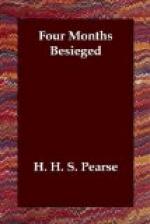General White forced to fight—The order of battle—Leviathan—The Boers reinforced—A retrograde movement—How Marsden met his death—Naval guns in action—A night of disaster—Who showed the white flag?—A truce declared—A humiliating position.
October 31.—If the action on Rietfontein, or Pepworth’s Farm ridges, a week ago was the great score for us that official reports represent, in that it checkmated all possible efforts of the Boers to intercept Brigadier-General Yule’s column on its march from Dundee, there can be no doubt that the tables were turned upon us effectually yesterday. Not only did our attempt to beat one of the enemy’s columns in detail, and capture the heavy Creusot guns that had been harassing us, fail through misdirection, but when attacked in turn by Boer reinforcements, our troops were untimely ordered to abandon a position that they had held for four hours without serious loss, and this gave moral, if not material victory to the enemy. Successful in every fight up to that point, we are now in the humiliating position of finding ourselves practically invested by a Boer force that will not attack except by artillery fire at long range, and whose leader has the power temporarily, at any rate, to choose the fighting ground that suits Boer tactics best if we decide to take the offensive. Not only so, but our little army here has suffered a great disaster in the loss of two gallant regiments, one of which had only ten days earlier gained for itself proud distinction by being first to crown the heights of Talana, near Dundee, where British infantry proved worthy of its most glorious traditions. As a purely defensive measure, if nothing more, the fight of yesterday was forced upon us. Like some other operations in this brief but eventful campaign, it came too late, but, whether timely or not, a battle was inevitable unless we meant to sit down tamely and be battered at.
Yesterday morning, long before daybreak, our force was on the move, intent upon outflanking positions which the Boers held two days earlier. Colonel Grimwood, with one brigade consisting of the 1st and 2nd King’s Royal Rifles, the Leicestershire and the Liverpool battalions, took up a position on open ground near Lombard’s Kop, supported by a regiment of cavalry, the Border Mounted Rifles, and the Natal Carbineers with three batteries. A fourth battery was posted on a green kopje almost directly in line between Lombard’s Kop and Rietfontein Hill. Colonel Ian Hamilton, with the second infantry brigade, consisting of the Gordon Highlanders, Rifle Brigade, Manchesters, and 1st Devons, formed a strong reserve behind the long ridge connecting these points with their left on the Newcastle road, where the Imperial Light Horse were held ready for action when the proper time should come.




